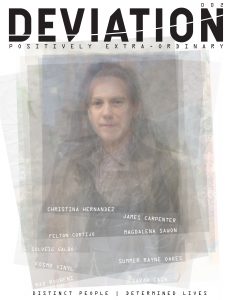Kosmo Vinyl Brings It Home

Photo by Sloane Morrison @redrabbitshootscolor
By Ash Hoden
Kosmo Vinyl speaks with a richness that immediately draws me in. He’s energetic, in tone and cadence. A personality. As he describes his childhood — bearing witness to mod culture, his family, and the liveliness of the people in his community — a full and vivid image takes form in my mind. His words paint the picture for me and I gain a lucid sense of where he comes from, or where he’s coming from. Kosmo lives a rich life and I believe that the two are not separate, the richness of his experiences and the richness of how he speaks about them.
“First time I worked on a street market was on the weekends when I was 9 or 10, and that experience has remained an influence ever since. Because the market guys back then, a lot of them, they were characters, you know. They weren’t petty criminals but maybe the next body right up to them were the petty criminals. There was a lot of characters and a lot of independent people. I mean much more independent than perhaps they realized — or more independent thinkers than they realized.”
They didn’t have the self-reflection but they were living these completely distinct lives?
“Exactly. Self-reflection, that’s a good thing you bring up because I wasn’t conscious of self-reflection. I don’t even know I was conscious of anybody being self-reflective. People just were. The market guys — they’re like barkers. They’re like carnies, really. You got to set it up, put on a show, right. These tomatoes won’t sell themselves ‘cause there’s a guy down there got exactly the same tomatoes. Exactly the same tomatoes. He bought ‘em from the same bloke, and I’m gonna charge more for mine.”
It’s amazing how the times have changed.
“Yeah, now we have no showmanship. In everyday life you don’t get much of a presentation anymore.”
It’s here that I recognize a much livelier street scene than what I’m accustomed to seeing. Everyday sidewalk activities no longer contain such theatrics. Produce vendors have been replaced by grocery chains and the nonstandard has largely been standardized. Working in the markets is where Kosmo learned to hustle, to talk his game, and it added to the character of his neighborhood — not simply his own character.
Kosmo was born in postwar England, 1957. “I grew up in East London in a very blue-collar environment. My father was a bricklayer. Before that my family had been dockworkers. As the docks declined they went into building. 50s, 60s in Britain — lots of bricks to be laid.”
During reconstruction, right?
“Exactly. It’s a fairly blue-collar, class-divided England. That was just the world I grew up into. Fairly rough and ready, but loving and whatever.”
What were you into?
“A kid, I guess, first big influences was music. Was the radio. Was records. Then the first real thing that I became tangibly aware was the mod phenomenon. We’re talking about ’65, something like that. I’m about eight and I had a stepbrother at the time. He was the mod. He was the ticket. I shared a room with him and he was the real fucking deal.“
He was your influence?
“That may still be my biggest single influence, at a certain level. Mods were very very specific about what they liked and what they didn’t like. These are more working class mods. These aren’t like real thinking mods — into Miles Davis and this and that. No, these guys weren’t like that. They were into American soul music, clothes, and girls. That was the three areas of interest. Clothes first. Themselves first. Very narcissistic. More than I realized. In a way they weren’t so different from my father and his brothers who were early, pre-rock ’n’ roll teddy boys. They were all working men but Friday night, Saturday, they all wore suits. They all had their hair slicked back. They all were immaculately turned out. I guess the common phenomena over here would be the Italian-American wiseguy, goodfella type thing. My aunt told me the first time she saw my father and his brothers at the bus stop they made her and her friends stand in front of them because the rain was splashing on their suits.”
No way.
Kosmo chuckles as he answers, “Yeah-hah. Mean! Egotistical guys.” He then refers to the book Dockers and Detectives in which Ken Worpole goes into the history of competitive working class dressing. “I guess this goes way back. The pure modernists would say, ‘Well, to really be a mod you wouldn’t work on a building site. That’s like a teddy boy thing, really.’ But that’s more of the environment that I grew up into — dressing up on the weekend. But it being an obsession.”
Did you absorb that?

Photo by Sloane Morrison @redrabbitshootscolor
“Yeah, I think I’ve absorbed that. Clothes have always been an interest to me, regardless. I don’t know that snobbery is the right word, but there’s a better than thou. One-upmanship. I’ll accept that as a part of my character.”
The mod trend died just as Kosmo neared his teens. “The next phenomenon comes along and I’m involved in that: the original skinhead thing, which was really a post-mod thing and shouldn’t be confused with what it became — revived in the 80s into a more brutal, more ugly thing. The original thing was almost like an extension of what they now refer to as hard mod. Because the mod thing really ended up going two ways. You had the guys who were trying to stay with the Italian-American, black-American look. And then you got the guys who started to dress out. ‘What’s the new thing baby?’ It really kind of split into two — the beautiful people and the harder mod contingent. The skinhead thing came out of that. It wasn’t that much different except it was a little bit more herd mentality rather than one-upmanship. But there was a standard that you couldn’t reach as a young kid. People talk about it now, and they say, ‘Oh you were a skinhead back then? Did you have this? Did you have that?’ It’s like, ‘I was twelve-years-old man. Nobody had everything.’ I’ve got the boots and jeans. Now I’m gonna get the shirt. But there was a jacket, there was a coat… You could never get everything. You can get the boots for Christmas and the jeans for your birthday right, but now you need the windbreaker and the shirt. ‘But what about a Fred Perry?! Oh my god! I’m never gonna get a Fred Perry.’ It would be like that. Everybody’s looking for a hustle.
“And with the skinhead thing came the reggae thing. I grew up in East London on the fringes of the West Indian community, so you were kind of aware of blue beat — or what we now call ska. There had been some crossover with that in the mod thing. Then reggae arrived in like ’69, ’70.
“So my early teens I’m just a kid working the markets, chasing girls, and doing that. My favorite band at that point in time was the Faces — Rod Stewart and Ron Woods. Faces’ crowd was crazy; very young and we were very very raucous. Singing along with everything, jumping around. Much wilder than The Stones were. Stones everybody’s sittin’ in their seat or standing in the spot. We would see The Who when we could. They were fantastic — still four in those days. Maybe once every couple of years I’d get a chance to see them, but the Faces you would get to see much more often. I ended up seeing the Faces 31 times. We used to sleep on the street as kids to get the tickets in the morning.”
I bet those were great shows.
“Well the funny thing about it is that we’d read in the Melody Maker or New Musical Express, ‘The Faces were their usual sloppy selves. Drunk and unprofessional.’ I’d be thinking, ‘God, that was the best show I ever saw!’ I guess we were oblivious. We were just happy to be with them, you know.”
How did the punk world come out of that?
“Well it’s funny you say that because, directly, it didn’t. But Glen Matlock told me that the first song they learned, before they had John [Lydon], was Had Me a Real Good Time. Which is a Faces song. That’s the first song the Pistols learned. They were one of the popular bands to that crowd when we were young. I saw the Faces at Brixton: Mick Jones is there, Glen Matlock’s there, Steve Jones is there, Paul Cook’s there, Paul Simonon is. All these people who became key figures in the London punk rock scene were at these shows. It didn’t affect the birth of punk directly, but when Rod Stewart went to Hollywood you could sense that it was all changing. Before that the Faces were these bunch of ne’er-do-wells. Having a good time anyway. Then he’s living in Los Angeles, he’s got a movie star girlfriend, and he’s left the band. It all changed. It wasn’t just him, but he’s a good indication of where rock music was going. About the same time as that I got my own flat.”
You moved out?
“Lifestyle, do you know what I mean. The lifestyle could not be accommodated at home.”
Going out and partying — you needed your space?
“At that point that’s taken over in life. Music becomes a little bit more secondary somehow because you’re just getting up to mischief. You’re going to nightclubs and you’re hanging out with mates, going to football, and doing all of these things. I think what happened with the punk rock thing… Leading up to it there’d been a few things going on, like this English band Dr. Feelgood. Very very important. They played a stripped down 60s R&B, and they were not user friendly. They played Route 66 and stuff like that, but they were really lean and mean. You know, fast and short. No bullshit. And that was something. Then there’s this guy Ian Dury who had this band Kilburn and the High Roads. I could never get anyone to go and see them twice. Nobody liked them.”
But you did.
“I liked them. And it turns out, again, Johnny Rotten, Paul Simonon, Steve Jones did.”
It’s the alchemy of the time?

Photo by Sloane Morrison @redrabbitshootscolor
“It was definitely moving towards something. Then a couple of the people — Malcolm McLaren, Bernard Rhodes — they sensed that. They had done what we hadn’t done. They had figured out that we weren’t happy and that it wasn’t any good. It needed to be exciting again. We hadn’t self-reflected — or maybe certain individuals had, but collectively hadn’t. A guy called Johnny Green, he described Dr. Feelgood as John the Baptist to the Sex Pistols, if the Sex Pistols was the coming of the Lord. ‘Cause some of them were aware that old rock ’n’ roll was a dangerous thing and it had gotten too user friendly. It had all got lame. So the Sex Pistols… The first time I recognized the Sex Pistols they were like a posse more. There was Sid and Siouxsie, and Bromley Contingent was attached to them, and they were wild dressed. Then I saw them play. They were just opening, and they were different. I mean the first minute you saw Johnny Rotten you thought, ‘Who the hell is that?’”
You related to it?
“Yeah, ‘cause your tastes have become more fringe. As the Rolling Stones become The Rolling Stones, which is an occasional occupation. And Rod Stewart has gone to Hollywood or whatever. And The Who — Pete Townsend’s forever got his head in his hands and can’t figure out what it all means, man. We were left to our own devices. Music-wise you’re tastes become more fringe because you don’t like most of what’s going on.”
How did you get in with them then?
“Well, it was a very very small scene. As the punk thing started to happen it became apparent to me that new people were getting involved. I had started going to gigs now and helping the roadies load the gear in and stuff like this. Get there early, help ‘em load the stuff, and don’t pay to get in. Pretty good deal. And maybe get to talk to a couple of people, you know.”
So really working your way in.
“Then when Stiff Records happened, it’s a small storefront in West London that two guys started on a loan from Dr. Feelgood — they said a couple hundred quid, or about 500 bucks. One of them is sleeping in the office. I went there for a job. Bloke is like, ‘We haven’t got a job for you to do. Come back and we’ll see.’ And I just kept going back. I think they realized I wasn’t going away. I had locked in. In the end they said, ‘Alright, I got a job.’ It was whatever needed doing. Carrying shit, running messages, roadying, going to rehearsals… Slowly out of that I built my way up. Trial and error and doing all these different things, I ended up doing publicity for Ian Dury.”
You guys just clicked?
“Well, word was he’s made a record again. When his first band Kilburn and the High Roads broke up they said it was his health, and you just believed that. You read it in the paper and believed it. So when he was making a record again I was really excited. At Stiff they’re all amused ‘cause I’m so excited. They’re like ‘This guy is completely jazzed about this record and he hasn’t even heard it!’ Anyway, the first record I was given to work was Sex and Drugs and Rock and Roll. So I was lucky, because it’s not like it was a daft record. They just set me loose on the world.”
To promote it? How did you go about that?
“Oh, I went around giving out copies to other people — to all the other record companies. ‘You didn’t put this out! You missed one here!’ I took it to everybody. Just everybody. And it worked. Then I went on the Stiff tour — like an old 50s package tour. It was Elvis Costello, Nick Lowe, Wreckless Eric, Ian Dury, and Larry Wallis. Me and this other guy were to be the MC’s. I was told the day before. They’re like, ‘You’re so loud. You’re so mouthy. Go up and do it on stage.’ Then Ian and I, we really hit it off. So I left Stiff to work with him. I worked with Ian intensely for a period of, I guess it was probably two years. Got to know a lot of people during that time, obviously, and I eventually moved over to The Clash.“
It was more of a casual thing? ‘Hey, come help us.’
“No, it was a bit more intense than that. I won’t say they were in a corner, but they were in a niche. They had conquered the Trash and Vaudeville world. In every town there would be this hip shop and everybody that shopped at the hip shop would know who The Clash was. But the world — The World — is out there. The whole damn thing. This show needed to be picked up and go international and bust out. They needed to commit to it and start thinking in those terms. Otherwise that’s just gonna run out of steam.”
It’s a whole different scale. Not just work, you have to see life in a bigger scale.
“And for someone like Joe Strummer that’s not difficult. It’s not like I had to bend their arms and force them to do it. But along comes someone who’s saying, ‘This isn’t good enough. Gotta get out there.”
Your purpose in joining was—
“To expand them as a phenomenon. I was part of a team that was doing that. We would encourage them to bite off more than they could chew. Or at least as much as they could chew. I did a couple of favors before then. Nothing sinister but Give ‘Em Enough Rope came out. There was a big press conference in London and the press agent for the record company said, ‘Everybody is intimidated. Will you run the press conference for us so we can get some questions and answers?’ She’s worried that nothing is really gonna be said and then that’s a lost opportunity. So I got in there and got it going — broke the ice so to speak.”
Do you feel like you can bridge the edginess of that world and—

Photo by Sloane Morrison @redrabbitshootscolor
“Very much so. Because I see it from both sides; see enough of it from both sides. I had kind of learned what I knew about music properly from Stiff. That’s a very independent, very anti-big corporation world. But I also learned within that the restrictions of that world. What they can and can’t do. So one’s aware that there’s a machine here to be exploited. What we have to do is get it to do what we want, instead of it getting us to do what it wants. This is the battle.”
How did you do that?
“Well, you don’t. You win some and you lose some. You catch ‘em out. And when you catch ‘em out they rewrite the rules so you don’t do it again. You learn after awhile you even have to think about when to catch ‘em out, because sometimes it’s not worth it. It’s like, ’We could actually do this now, but let’s not do it now. Let’s wait and do it with the LP.’ So a lot of strategy. It’s funny, because we’ve gone from not being aware of self-reflection to massive self-reflection. You’ve got to figure out what it is that’s important and what it is that you can let go of. You’ve got to, because you’re gonna compromise. So there are things that you don’t want to compromise on. In life.”
It seems like that’s a necessary part of taking it to that bigger scale — being clear about who you are and where you are.
“Absolutely. I would say that’s an essential part of life. You’ve got to figure out — what are you willing to trade off? How important is it to you? Because if it’s that important and you hang on to it, then don’t be bitching that you ain’t got so-and-so. Because you’ve given that up to get this.”
You found that it was family?
“It’s just… The world’s so transient, isn’t it. So your family is like your dearest friends. They’re a set thing. When I became a father, it was unconditional love. I’ve got these little guys, and you walk in the door and the day’s gone really shitty — and you’re heavyweight champion of the world. You is the greatest of all time! You’re like, ‘How fantastic is that? He don’t give a damn.’ You’re at home and, ‘Look, I’m Red Power Ranger!’ You’re like, ’It’s true. That is fantastic!’ You value these things.
“Now I’ve reached that point where people are dying. It’s odd because when you’re twenty and someone’s 32 you don’t really think about it. But now I’m 61. Some of these people are outlaws, you know, so they live hard. It’s not sustainable forever. Some people reign it in and some people are gunfighters to the end. It’s just the way they gotta be. Now I’m experiencing that — losing people. And people that can’t be replaced. Not like, ‘Oh, we’ll find another guy.’ No, there isn’t anybody like that. You realize, this is the treasure. Not some guy worried about the value of his house. I mean if that’s what he’s got to worry about, good luck to him. You learn that these people — these characters and the people you really care about — that’s the treasure. Family is in a sense like that. Because these are people you’ve had experiences with, and you’ve been through things with, and you’ve witnessed them go through their things, and that bond is priceless. That’s not an opinion, that’s fact.
“So I’ve been attracted to people that have found their own way of doing whatever it is they’ve wanted to do. And they’ve found that by knowing what they’re willing to give up and what they’re not willing to give up. When I was nineteen and I met Ian Dury he was living in this coldwater flat opposite a cricket ground, right. No bathroom. Just toilet and sink. They got no money. They’re living off cigarettes, hashish, and doughnuts. And they don’t care. They’re looking out the window — they’re real bohemians, you know. Dury’s in his thirties and he’s looking at the commuters, ‘Fuckin’ idiots. Look at ‘em.’ And none of Ian’s friends seemed to have any money and none of them seemed bothered. It wasn’t like they were concerned. It was a whole other criteria.”
For what life is about and—
“What is success and what isn’t and what is worth doin’ and what’s not worth doin’. That really took my head off in the sense that I had grown up very hustly. I had been working in the building site and working in the pub, because I’m chasing this girl and so I want to go out Wednesday. And Saturday because I’m chasing that girl too. So I need like 40 quid!”
When you were exposed to that did you relate to it?
“You start to see things completely different. It started with Stiff, through that. Then I’m introduced to a whole other world. I mean, growing up I didn’t know anybody that had been to college or university. They didn’t live where we lived and you just didn’t know anybody. Who would you know? My father thought students were bums. What you do instead of getting a job is you go to school some more. Study something that’s completely useless for five years.”
So you were meeting people that were—
“Educated, with world views. When I first started working at Stiff I met this guy Barney Bubbles, who’s a great graphic designer. History will one day put him down as the best postwar British graphic designer. Definitely. So I’m down at Stiff Records and everyone says, ‘Go down in the basement and help Barney.’ I’m down there and Barney’s making a record cover. Well I’ve looked at every record cover in London — between the ages of nine and sixteen I’ve been in every record shop and looked at every cover. It never entered my mind that somebody designed it! I wasn’t a stupid kid. I just never thought. It just was. So Barney’s making a cover and it happens to be Richard Hell, Blank Generation. I’m like sittin’ on the stool watching. Then through Ian, his friend Peter the Painter is Peter Blake! These are the first two guys I ever met that I knew did art, were Barney Bubbles and Peter Blake! They’re the first two. That’s just how it happened. I’m meeting all these people so my world view is expanding.”
And you were open to it — hearing these different ideas.
“Yeah, but… These people were great! And they’re not dissatisfied.”
You see how their ideas and their way of being go together?
“Yeah, there’s not the separation of, ‘Go to work and do what you don’t like to get the money to do what you want.’”
It doesn’t work that way.
“No, it doesn’t work that way. First off, you don’t do what you don’t want to do. Or, if you do it, you do it as infrequently as possible. So you go without. You develop your own sense of style and you don’t need the latest jacket.”
Did you go through that transformation?
“Absolutely. You start to see things differently. Doesn’t mean you can’t be stylish but maybe you don’t have to run around chasing whatever these people… Why are they dictating to you what style is? That’s what the punk thing all brought on. ‘We don’t need this shit. Why not make our own?’ Then, like, don’t care about the girls that think you look too weird. They’re stupid anyway. Listen to ‘em talk all night? Nah.”

Photo by Sloane Morrison @redrabbitshootscolor
You find more interesting ones that are in your world.
“Of course. When you get out of blue collar world then there’s all kinds of interesting people everywhere. That was a big leap for me — the move from East London to West London. For awhile I was straddling these two worlds. I’m hanging out with guys that would beat me up if they didn’t know me, practically. You can’t go to soccer anymore looking like that. Once you start becoming a weirdo then you’re a weirdo. People are easily offended. You’re an outsider, and then you’re fair game to be picked on.”
The Clash’s run fizzled in the mid-80s, right around the time of Thatcher’s second election and the miner’s strike in England. “People didn’t stand with the miners and I had kind of had it. I came to New York.” Kosmo settled in the East Village with his future wife, working in film doing art department and set decoration until he found that it wasn’t for him. “Unless you were near the camera you were not near the director or the actors. I’m interested in, ‘How is this getting done?’ When the record’s made I want to be there in the studio. And also, too much time apart from my wife. You’re up early, you’re back late. Six days a week. My wife’s like, ‘Yeah, well, we’re making money and I see you one day a week. That’s not so great. It’s not like a life together.’”
It’s the hustle again.
“Then I was just doing various things. Had a go at record production, but it was moving in the wrong direction. Everybody’s downgrading into home recording when I become interested in the recording process. I would be old school and want people in the room, interacting. That’s a rarity now. That’s a luxury. It wasn’t to be. Then we started a family and I was Mister Mom. My wife had a job and I took the kids to school and did all the stuff. It was fantastic, hangin’ out with my kids. We had a great time.”
And you’ve seen them through?
“All the way through. And then a friend of mine, he’s a graphic designer, been pestering me for years to do something. ‘What are you doing? What are you doing?’ I’m like, ‘I’m with the boys. What do you mean, what am I doing? Look at them. They’re fantastic.’ He’s like, ‘You’re going to waste man. You should be doing something.’ He meant something more tangible.”
When Kosmo’s sons were older — now 26- and 21-years-old respectively — he began to put his spare time and energy into various art projects. “I love postcards. I like the whole concept. They’re cheap, they’re proletarian, they’re not private, you don’t have to say too much. I just really liked it, so I started making my own.”
And the effort of sending something physical, even though you don’t say too much, it still lets the person know.
“Absolutely. ‘Thinking of you.’ Especially when you move away from so many people. It’s a great way to maintain a relationship. It’s maybe talismanic or whatever. It’s the vibe. I believe very very much in that.”
Kosmo created postcards for a friend who had moved to Canada. From afar, they each supported different Premier League football teams and his handmade postcards were an ongoing dialogue. More than sport it was about the loss of community. He began posting each card in a blog called Is Saitch Yer Daddy? “I decided like an idiot — not knowing what I was getting myself into — I said I would make a piece for every single game that they played. And I would have the piece up before the next game kicked off. So it would be a true reflection of the state of being before the next game.” Originally envisioned to be a one season commitment, this project expanded into five seasons and over 220 original pieces. Through the graphic designer who had been pestering him to do something creative it was shown at a gallery in London. “I had done the first year and then this show was coming up so I thought, ‘Well, I’ll do another year.’ I’m not gonna say to them, ‘I’ve already stopped.’ Then the team was moving it’s ground, which was gonna be a big cultural event. So I thought, ‘I’ll do it until they move.’”
That project concluded last May, just in time for the 2016 presidential campaign. “I view the five years of doing Is Saitch Yer Daddy as my art school time.”
It had that consistent deadline where you’re constantly producing.
“Exactly. That’s my time served.”
Trump’s presidential campaign was so egregious that Kosmo felt morally compelled to speak out. “I felt like I couldn’t do nothing. This guy is unbelievable.” His response was Cisco Kid vs. Donald Trump. Repurposing a comic strip created in the ‘50s by José Luis Salinas, Kosmo replaced the original text with commentary related to Trump’s ongoing circus show. “The thing that really pushed me over the edge was when he was on Saturday Night Live; when he had already made the ‘Mexicans are rapists’ comment. My feeling was that, ‘If he had made that comment about Jews or blacks he would not have been allowed on Saturday Night Live. What does that say about us? Because he said that about Mexicans and not about Jewish people or black people, it’s okay?’ Then I thought, ‘Who will stick up for Mexicans? Cisco Kid sticks up for Mexicans.’ That’s why I picked him.”
And each piece is a commentary about the campaign as it moved along?

Photo by Sloane Morrison @redrabbitshootscolor
“As it moved along, yeah. I would just do it as I felt something to comment on.”
Kosmo continues to create new pieces for this series, which was shown at last year’s SPRING/BREAK Art Show in Times Square and opens January 20th at the Different Trains gallery in Decatur, Georgia. He also worked with a friend on another series of postcards called To and Fro that was recently shown in Athens, Georgia. “We started doing them backwards and forwards. He sends a card and I reply to it.”
You did that leading up to the show and then selected the ones to display?
“Yeah, and he’s one of these real put it off to the last minute merchants. So he was like, ‘Maybe we can still come up with some good ones because now I’m starting to think mine aren’t so great.’”
The pressure was on.
“Yeah, but I like that. I’m still learning how to have different things going at once. I’m finding at the moment I still need to be fairly focused on one thing.”
I’m like that too. You’ve got to really get inside of it.
“Exactly. I’m still thinking in execution. ‘Is this what I want to say?’ Otherwise it’s gonna be, ‘And another thing. And another thing. And another thing.’ This is the problem with political commentary — you get worn down by it. It’s not that the person isn’t making valid points. It’s just that you can’t tap someone on the shoulder a hundred times.”
With that Kosmo brings it home, so to speak. If you’re not exploring new terrain, as he has done throughout his life — letting go of this in order to have that — you’re merely tapping the same shoulders over and over again.
Get Deviation Issue 002 (Print or Digital)
[fbcomments width="100%" num="10" ]



